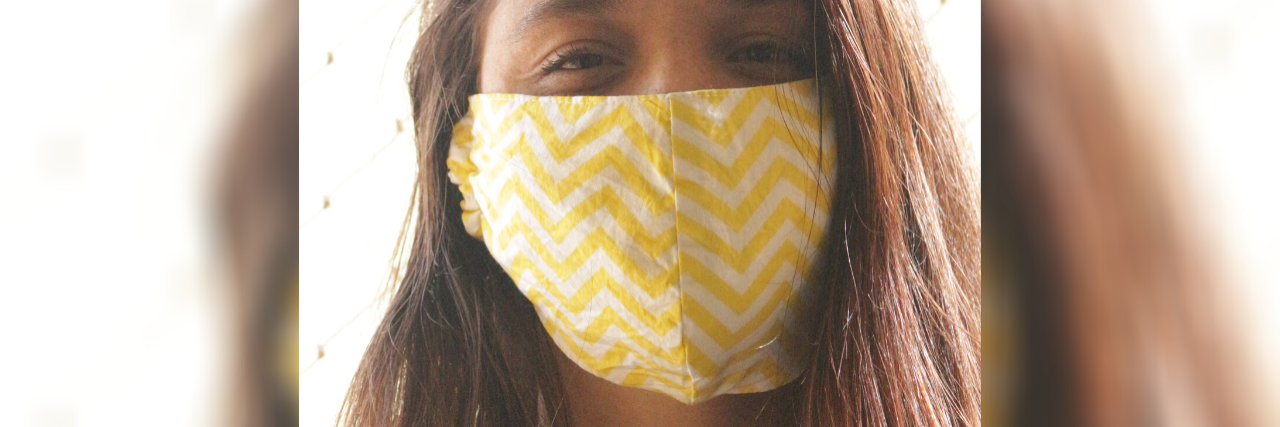What to Know If You’re Finding Your Empathy Challenging During COVID-19
Editor's Note
Join The Mighty’s Coronavirus group to connect with other Mighties living through the pandemic. Read the latest updates, share helpful tips, or give and receive virtual support.
I’ve always thought that anxiety and empathy go hand-in-hand. Those of us who know how it feels to feel constantly on edge, who are always on high alert, tend to become hyperaware of others’ emotions. I find that I can get so caught up in the emotions of my favorite characters in books and movies; the powerful words of a song easily bring me to tears. I find others’ joy and laughter contagious but am equally pulled in by their hardships and pain.
When the novel coronavirus (COVID-19) began to spread around the globe, I was quickly sucked into the news cycle. It started out innocently enough; I was in the final semester of a Master of Public Health program, witnessing an event I had learned about but never anticipated experiencing firsthand rapidly expanding on a global scale. The constant updates and subsequent closures of our societal institutions left me wanting to stay ahead of the news; I didn’t want to miss a beat.
And as the virus began its spread around North America, my focus turned to individual stories. Stories of overburdened health care workers, our heroes, taking their own lives. Stories of people dying in their homes, with their loved ones down the hall, unable to be close to them for fear of suffering the same fate. The seemingly endless stories of economic hardship and strain, which I experienced firsthand when I was laid off because of COVID-19. Stories of domestic violence, and the heart-wrenching mass shooting in Nova Scotia, where so many innocent lives were selfishly and tragically taken.
My anxiety and empathy were in overdrive hearing these stories. I could physically feel the anxiety, held by so many around me, like a constant electric current keeping my body on high alert. I cried reading about the tragic losses of life, from the family members and loved ones who are left behind. I wept as my family and I lowered our flag to half-mast to honor the victims in Nova Scotia, my stepmom’s home province. I worry for my brother and sister-in-law, both police officers, and my best friend, an ER nurse, putting themselves at risk every day that they go to work.
But somewhere along the way, other stories began to emerge. Stories of community: of people staying home to protect one another, volunteering to shop for their elderly and immunocompromised neighbors, of drive-by birthday parties and even weddings. Stories of support: cheering for our health care workers every day at 7 p.m., banging pots and pans as loud as we can. Stories of restaurants donating meals to those on the front lines, of distilleries repurposing their production line to create much-needed hand sanitizer, of university students finding innovative ways to build masks and personal protective equipment. Stories of families being silly together, creating art projects or family bands, stories of virtual game nights and happy hours.
A funny thing happened when I chose to focus on these stories. These big and small acts, which could be easily eclipsed by what we are experiencing right now, brought me so much hope and joy. I cried happy tears watching all the first responders in Vancouver create a parade of fire trucks and police cruisers outside St. Paul’s Hospital. I laughed watching people teach their younger siblings and parents the latest online dance challenge. I smiled when I saw and heard, from afar, the art, baking and songs created by my friends and family.
In this time of great uncertainty, I challenge you to view your empathy as a superpower. Like me, you may be feeling overwhelmed with everything going on. We are all learning to get through this together, and no one has all the answers. It’s more than OK to feel the pain of this global traumatic event, but your big heart and brave soul give you the power to also feel the joy of life in equal measure. I certainly don’t have all the answers. But in the wise and timely words of Glennon Doyle Melton:
“I’m not a mess but a deeply feeling person in a messy world. I explain that now, when someone asks me why I cry so often, I say, ‘For the same reason I laugh so often — because I’m paying attention.’ I tell them that we can choose to be perfect and admired or to be real and loved. We must decide.”
I encourage you to laugh and cry as much as you need because I know you are one who pays attention.
Struggling with anxiety due to COVID-19? Check out the following articles from our community:
- What to Do If the Coronavirus Health Guidelines Are Triggering Your Anxiety or OCD
- How Can You Tell the Difference Between Anxiety and COVID-19 Symptoms?
- 6 Tips If You’re Anxious About Being Unable to Go to Therapy Because of COVID-19
- 7 Things to Do If Social Distancing Is Triggering Your Depression
Photo by André Ravazzi on Unsplash

